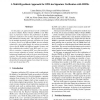Free Online Productivity Tools
i2Speak
i2Symbol
i2OCR
iTex2Img
iWeb2Print
iWeb2Shot
i2Type
iPdf2Split
iPdf2Merge
i2Bopomofo
i2Arabic
i2Style
i2Image
i2PDF
iLatex2Rtf
Sci2ools
142
click to vote
ICDAR
2009
IEEE
2009
IEEE
A Multi-Hypothesis Approach for Off-Line Signature Verification with HMMs
In this paper, an approach based on the combination of discrete Hidden Markov Models (HMMs) in the ROC space is proposed to improve the performance of off-line signature verification (SV) systems designed from limited and unbalanced training data. This approach is inspired by the multiple-hypothesis principle, and allows the system to choose, from a set of different HMMs, the most suitable solution for a given input sample. By training an ensemble of user-specific HMMs with different number of states, and then combining these models in the ROC space, it is possible to construct a composite ROC curve that provides a more accurate estimation of system's performance during training and significantly reduces the error rates during operations. The experiments performed by using a real-world SV database with random, simple and skilled forgeries, indicated that the proposed approach can reduce the average error rates by more than 17%.
| Added | 18 Feb 2011 |
| Updated | 18 Feb 2011 |
| Type | Journal |
| Year | 2009 |
| Where | ICDAR |
| Authors | Luana Batista, Eric Granger, Robert Sabourin |
Comments (0)

